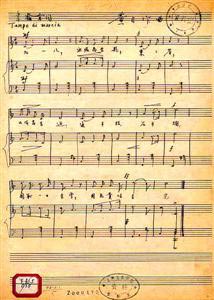 |
|
Musical notes of The September 18. [File photo] |
Since then, Huang wrote a large number of anti-aggression patriotic songs, such as Song of Seething Blood, The September 18, Song of the Chinese Army, Sleeping Lion, and Looking North. He was praised as the "king of patriotic music" by fellow musicians.
In addition to the composition of patriotic songs, Huang also played an active role in anti-Japanese movements. He organized a salvation union with teachers and students at the National Musical Academy where he taught, and publicized the importance of resistance against aggression in many different places.
In his Song of Seething Blood, he called on his "four thousand million compatriots" to "pledge our lives for a land free from oppression and bullying" and "seize the glory of victory by shedding our blood and risking our lives". He had said with hope and passion that he looked forward to writing songs celebrating the victory of the war. However, he died of typhoid complications a year after writing Song of Seething Blood in 1937.
Huang Zi is not only the first composer who devoted his career to patriotic music composition and had widespread influences, but also the founding father of patriotic music in China, comments Qian Renping, professor of the Composition Department of Shanghai Conservatory of Music.
Related:
8 classic Chinese movies on War of Resistance against Japanese Aggression
'Lost' movie Kukan brings home horror of Japanese occupation